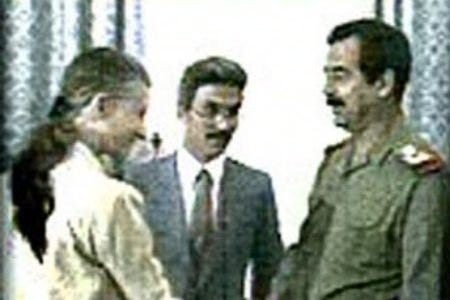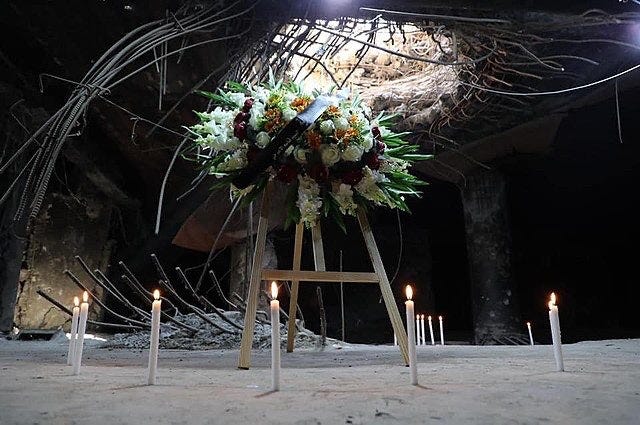#4 The Mother of All Battles, part 2
‘Utopia’ at War
America is Utopia achieved.
We should not judge their crisis as we would judge our own, the crisis of the old European countries. Ours is a crisis of historical ideals facing up to the impossibility of their realization. Theirs is the crisis of an achieved Utopia, confronted with the problem of its duration and permanence.
Jean Baudrillard, America (1986)1
i
For the men of the 4th and 5th Marine Expeditionary Brigades and the 13th Marine Expeditionary Unit, still idling aboard their ships in the Persian Gulf several weeks into Operation Desert Storm, the Gulf War experience was less Sands of Iwo Jima, more Waiting for Godot. The requirements of General Norman Schwarzkopf’s strategy of massive deception meant that, for these 24,000 elite soldiers, Godot would never arrive. That the American military could afford to deploy such a large force and have it do nothing was a measure of the almost unimaginable resources available to it in those halycon very late Cold War days2.
Unsurprisingly, the Marines’ non-adventures largely escaped the notice of CNN, which was broadcasting around-the-clock coverage of the considerably more exciting air campaign. Bombing had got underway the night of January 17th 1991.
The Atlanta-based Cable News Network, launched by Ted Turner in 1980, had steadily built up its subscriber base in its first decade, but the Gulf War would prove to be a watershed event for the enterprise. CNN was the only news outlet able to broadcast from inside Iraq during the first few hours of the Coalition bombing campaign. And what’s more, the network’s broadcasts from inside the al-Rashid Hotel in Baghdad were typically made live, a relatively new development in TV war reporting. Analysis was provided by Stateside pundits like the improbably-named Wolf Blitzer, the network’s Pentagon correspondent. The Gulf conflict would serve as a dramatic showcase for CNN’s real-time, 24/7 rolling news, underscoring just how radical an innovation it was. Here was modernity’s most quintessential experience, the shock of the new. Perhaps this explains why CNN would find its viewership soaring, sending Ted Turner’s outfit surging past ‘the Big Three’ American TV networks (CBS, NBC and ABC) for the first time3.
Twenty-five years earlier, the older networks’ graphic coverage of the Vietnam War had provided the shock of the new. In that instance, the consequences hadn’t been very positive for the US government—the relative lack of censorship had contributed to the rise of organised opposition to the war, which by the late sixties had become so intense it was not only impeding the war effort but also inciting civil unrest4.
Mindful of those earlier troubles, for Operations Desert Shield and Storm Western governments and the mainstream media colluded to craft an edifying narrative. As I noted in in the first in this series on the Gulf War, journalists were attached to combat units and their reportage was subject to government oversight and approval. Certain facts and images were withheld until months after the war’s end, and this careful curation of information, combined with the dazzling spectacle of the early 90s Western war machine in action, produced just the effect on public opinion governments and the military-industrial complex intended5.
While Western propaganda of the early 90s was significantly less crude than today’s, it certainly wasn’t objective: one CNN reporter described bombers taking off from Saudi Arabia as a ‘sweet, beautiful sight.’6 Where gestures were made in the direction of objectivity they were almost always out of necessity. Baghdad-based CNN correspondent Peter Arnett, a New Zealander, attracted enormous attention as the only reporter to have live coverage from the Iraqi capital. He seemed to have won the trust of Saddam himself, with the Iraqi president granting the reporter a rare interview. Arnett stirred up controversy with hard-hitting reporting on what can charitably be called Coalition blunders, such as the bombing of the Amiriyah air-raid shelter that resulted in at least 400 civilian deaths (Wikipedia claims 1500)7 . No doubt his continued stay in Baghdad was conditional on him serving up this ‘unpatriotic’ (as it was condemned in some quarters) reportage.8
If Amiriyah was the result of a terrible error, a tragic bureaucratic cock-up, then it was a rare one in a military campaign calculated and controlled to a degree of precision hitherto not seen. Here was a war that took place more fully than any before it in the Turingzeit—Friedrich Kittler’s term for the age of calculating machines, ie computers9. Calculating machines played a role in the Gulf War at least as important as that played by men—a shift toward automation so dramatic as to lead Jean Baudrillard to declare, in January 1991, that no war was in fact taking place. What was occuring in the Gulf was merely a gigantic, inhuman technical procedure devoid of passion or any other human emotion10.
ii
‘Collateral damage’ notwithstanding, the passionless videogame war (as the media tended to present it) appeared to produce nigh-on perfect results, with Saddam’s forces being seen off at the cost of an almost ridiculously low number of Coalition casualties11.
With the conclusion of the war it came to be widely believed by Western publics that the resounding victory over Saddam had been easily won and a foregone conclusion: a complacent notion that fed into the utopian End of History mood, which dominated the 1990s12.
Almost completely ignored by the public was the Bush administration’s questionable response to Iraq’s military buildup in the days and weeks before the invasion in August 1990. As one NY Times article of that year puts it:
The Administration's message to Baghdad, articulated in public statements in Washington by senior policy makers and delivered directly to Mr. Hussein by the United States Ambassador, April C. Glaspie, was this: The United States was concerned about Iraq's military buildup on its border with Kuwait, but did not intend to take sides in what it perceived as a no-win border dispute between Arab neighbors.13

Did the White House simply misread the situation? Perhaps. It might’ve seemed reasonable to suppose Iraq was exhausted after 8 years of war with Iran, and that any invasion that might occur would be limited in scope and aim only at securing concessions from Kuwait—eg some drilling rights and/or debt forgiveness. According to the NYT:
President Hosni Mubarak of Egypt and King Fahd of Saudi Arabia, who assured the Bush Administration that Mr. Hussein would not invade, argued that the best way to resolve an inter-Arab squabble was for the United States to avoid inflammatory words and actions.
Some senior Administration officials said the strategy was also rooted in the view that Washington - and most of the Arab world - probably could live with a limited invasion of Kuwait, in which Iraqi forces seized bits of Kuwaiti territory to gain concessions.
Yet there is a darker possibility: by feigning indifference Washington deliberately baited Baghdad into a full-scale invasion. Nowadays a large proportion of the Western public expect such skullduggery from their leaders as a matter of course, but back in the early 90s conspiracy theorising of that sort was a more fringe pursuit. The reader may judge it naive, but there was greater public trust of the political elite in those days; dark, paranoid theories did not form so easily in people’s minds.
For the vast majority of the Western public, the media’s postwar narrative—that the outcome represented the inevitable triumph of Western virtue and arms—was entirely plausible. But as we shall see, a key vulnerability on the Coalition side meant the Gulf War could easily have turned into a debacle. Highly unconventional though Saddam’s major war stratagems were (and I detail them all in The Mother of All Battles, part 3), one of them almost produced a major upset. The Iraqi president’s actions during the conflict are also of great interest for another reason: they shed light on the sort of attitudes toward the West then prevailing in the Third World, as it was still referred to at that time.
Largely left out of the triumphalist narrative were the great human and environmental costs of the war. The long-term consequences of the mother of all battles would blight many lives for decades to come, while the hubristic End of History discourse the war helped to establish would have grave repercussions for the West in the early 21st century. These are touched upon in the third and final part of The Mother of All Battles.
Baudrillard, Jean, America, Verso 1986, translated 1988.
Finlan, Alastair, Essential Histories The Gulf War 1991, Osprey Publishing 2003.
Such was the impact of the network’s real-time news coverage on the media and political landscape that commentators in the early 90s began to speak of ‘the CNN effect’. CNN’s popularity brought the last vestiges of the slower, day-by-day news cycle to an end. The 24/7 news cycle that replaced it placed new demands on key actors like governments. Of course the CNN effect is but one of the ways the emergence of so-called real time has radically reshaped society and consciousness.
Britannica, The Vietnam War and the media.
The most notable censored photo was of a charred Iraqi soldier who died trying to escape from his truck on the infamous Highway of Death, a stretch of road on which thousands of Iraqi troops had been massacred by strike aircraft as they attempted, late in the war, to flee back to Iraq. According to a 1991 Washington Post article, Ken Jarecke’s gruesome and now-famous image was not published anywhere in the United States until the July-August 1991 issue of American Photo, although London’s Observer and Libération of Paris had published it immediately, just a few days after the February 28th ceasefire. The Observer had received complaints over the disturbing image.
Wikipedia, CNN controversies: Persian Gulf War.
Wikipedia, Amiriyah shelter bombing.
Wikipedia, Peter Arnett: Gulf War.
Sale, Stephen and Salisbury, Laura (editors), Kittler Now: Current Perspectives in Kittler Studies, Polity Press 2015.
Baudrillard, Jean, The Gulf War Did Not Take Place, Bloomington 1995.
The Coalition death toll is recorded as 292, with almost half those deaths the result of non-hostile action. Iraqi combatant deaths are estimated at between 20,000 and 50,000. In addition, officially there were 3664 and over 1000 Iraqi and Kuwaiti civilian deaths respectively (source: Wikipedia).
Arguably History continued to be at an end (albeit less convincingly after 9/11) until finally restarted by the 2008 financial crisis and the realisation, around the same time, that liberal democracy was unlikely to triumph in Iraq and Afghanistan.
The New York Times, CONFRONTATION IN THE GULF; U.S. Gave Iraq Little Reason Not to Mount Kuwait Assault, September 23, 1990.




